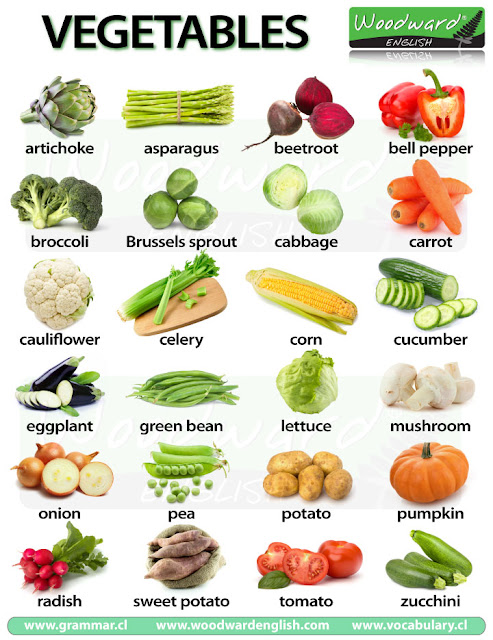- vocabulary related to food
- modal verbs: can/can't/must/mustn't/should/shouldn't
- possessive adjectives (my/your/his/her/his/its/our/your/their)
- possessive pronouns (mine/yours/his/hers/its/ours/yours/theirs)
..................................................................................................................................................
FOOD


EXERCISES:
- Match the food: fruit
- Vegetables vocabulary
- Match the food: vegetables
- Fast food vocabulary
- Questions about British food
- Exercises: adjectives for food
- Multiple choice: food
- GAME about food
..................................................................................................................................................
MODAL VERBS
MODAL VERBS
Modal verbs are commonly used verbs with some special characteristics:
- Modal verbs do not take "-s" in the third person.
- I can play football.
- My brother should go with you.
- She can't be serious about that.
- They have their own negative and do not need "do".
- I shouldn't be late
- They can't drive.
- You couldn't swim when you were 3.
- The don't have all the tenses other verbs have.
- I will can go.- INCORRECT
- They shoulded speak to her. - INCORRECT
- They are always followed by another verb (bare infinitive)
WHICH VERBS ARE MODAL?:
- CAN / CAN'T
- MUST / MUSTN'T
- SHOULD / SHOULDN'T
- NEED / NEEDN'T
- SHALL / SHAN'T
- COULD / COULDN'T
- MAY / MAY NOT
- MIGHT / MIGHTN'T
- WILL / WON'T
- OUGHT TO
- Englisch Hilfen: can - can't
- Englisch Hilfen : can (affirmative/negative/question)
- Englisch Hilfen : must - mustn't
- can - could - be able to
- Exercise: can - must - should
- Exercise: all modals: difficult
- To Learn English: must / can / should
- Learn English Feel Good: can / must / should
- Learn English Feel Good-2: can / must / should
POSSESSIVE ADJECTIVES AND POSSESSIVE PRONOUNS
These exercises will let you revise your subject and determiner personal pronouns:
SUBJECT
These pronouns replace any other subject and they usually go before the verb:
- Are you 15? (= the person I am sepaking to)
- We don't like going to the beach. (=my sister and I)
- They are our best friends. (=Sandra and Lynn)
POSSESSIVE ADJECTIVES
These determiners go before the noun and they tell us who (or what) the object, person... belongs to:
- I have a cat. This is my cat.
- Their homework is really difficult.
- My sister has a boyfriend. Her boyfriend is tall.
..........................................................................................
EXERCISES
- subject pronouns
- subject pronouns 2
- what type of pronoun is it?
- possessive adjectives
- possessive adjectives 2
- possessive adjectives 3
- possessive adjectives 4
- possessive adjectives 5
- possessive adjectives 6
- possessive adjectives 7
..................................................................................................................................................
- It is my cat. It is mine.
- It is your bag. It is yours.
- Those are her books. They are hers.
EXERCISES
- exercise a4esl.org - choose the right pronoun
- exercise a4esl.org - choose the right pronoun 2
- my english pages - possessive adjectives (my) and pronouns (mine)
- learn English feel good - write the pronoun
- learn English feel good - write the pronoun 2
- English test - 10 sentences - choose the right pronoun




No comments:
Post a Comment